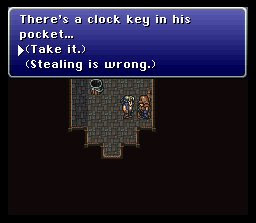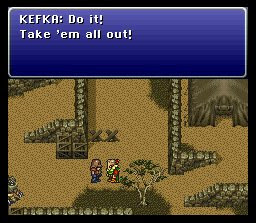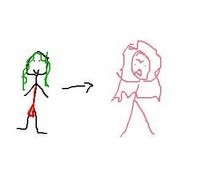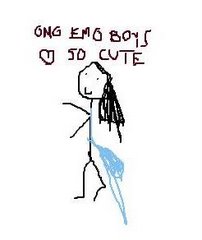

You may notice that Matty and I have chosen to play the original version of FF6, the one released in North America for the SNES as Final Fantasy 3. There is now an alternative version of this game for the GBA (the Playstation one doesn't count, because it is lame.) Now, we are not purist snobs here at FFNerds, and we love FF6 Advance accordingly. Here are some of the awesome features that FF6A has that FF3us does not:
1) A high-difficulty bonus dungeon after you beat the game, which is nice, since FF6 is an easy game where a lot of the time, unless you're doing specialty challenges, you never get to use half of your Kewl Powerz.
2) Extra espers, the coolest of which is a Cactuar esper that gives you Quick (Haste2 and +2 speed at level --Matty) and is a tricky fight. (Gilgamesh appears, although without his theme song, which instantly makes him less cool.) 3) You can play it on the bus.
3) You can play it on the bus.
4) The best feature of all this, however, is a brand new official translation, which to the best of my knowledge is more faithful to the original Japanese. This translation breaks away from a lot of what fanboys perjoratively refer to on the internets as "Woolseyisms" that pepper the game text of FF3us.
Now, let's talk for a minute about Ted Woolsey. He's the guy responsible for the official English translations of most of the 16-bit Squaresoft classics: Final Fantasy 6, Chrono Trigger, Secret of Mana, and Super Mario RPG. He would translate chunks of game text, out of context, all by his own, and was given pretty small amounts of time to complete these translations. And this game text also had to comply to Nintendo's pre-game ratings system of censorship, which basically existed to make sure that no parent could possibly be offended enough by a game to lead to a possible lawsuit. Not only could games not be too violent, they also had to avoid touching on death, sex, or religion. Not talking about death seems like a tall task in a game where your goal is to, I dunno, stop a villain from killing people, and where a PC's wife and small child are wiped out with his entire country in a cutscene, and where another PC tries to kill herself after she believes that everyone she loves is dead. It's hard to even repeat that sentence without using the words "kill" or "dead" at some point, and yet Ted Woolsey manages this for the entire game. And it's not like he does this by changing events in the game. In the image to the right, for example, we still learn that Cyan's wife and kid have just drunk Kefka's poisoned kool-aid of death. Woolsey just has to cleverly replace the word "die" with such euphemisms as "leave me," "be defeated," or "pass away."
lead to a possible lawsuit. Not only could games not be too violent, they also had to avoid touching on death, sex, or religion. Not talking about death seems like a tall task in a game where your goal is to, I dunno, stop a villain from killing people, and where a PC's wife and small child are wiped out with his entire country in a cutscene, and where another PC tries to kill herself after she believes that everyone she loves is dead. It's hard to even repeat that sentence without using the words "kill" or "dead" at some point, and yet Ted Woolsey manages this for the entire game. And it's not like he does this by changing events in the game. In the image to the right, for example, we still learn that Cyan's wife and kid have just drunk Kefka's poisoned kool-aid of death. Woolsey just has to cleverly replace the word "die" with such euphemisms as "leave me," "be defeated," or "pass away."
Another problem? space constraints on the cartridge. You notice a lot of lines of dialogue that are written to use the bare minimum of characters, and monster names bear the brunt of the squishing. This means a lot of people in FF6 will replace "them" with "em," for example. It also means that fearsome monsters like TunnelArmr are allowed to run about with impunity.
Despite, and perhaps because, of these setbacks, Woolsey's writing is quirky and idiosyncratic. His contribution to Japanese RPGs in the west was not only making them readable, but making them quotable. People often quote this Sabin line as an example of "Bad Woolsey," but I like it. Yogi Berra could have said it. And I think it gets the message across perfectly, in a way that's in character for the dumb jock who doesn't understand why people are singing at the opera: that were it not for the arbitrary decisions of rulers, General Leo would be one of the good guys too. Leo's like the Bernie Williams to Gestahl's George Steinbrenner. I can dig that.





Kefka is really the ideal villain for Woolsey's style, because he's a little kooky and off the beaten path as far as villains go. He isn't self-collected and brooding, like a Magus or a Sephiroth. He's insane and goofy, clever and unpredictable, and more than any other villain in the series, eminently quotable. Kefka never speaks in ellipses. He speaks in awesome.
That's not to say, of course, that I am ratting on the new translation. I love most of what the new translation does, and I think it's worth paying the $30 for a new game just to play the new translation, free from the company's earlier restraints on words like "death," "holy," and "pregnant." However, I don't think it's fair to dismiss Woolsey and the neat things that he did with FF6's translation. I would happily play either version anytime (although FF3us's sound quality is much better.) Godspeed, Ted, wherever you are.
Can two nerds do it? Take the most epic journey across the Final Fantasy Universe ever? Can they avoid being knocked down in I, find the first Chocobos in II, play the long, lost forgotten cousin III, cleanse their soul in IV, save the crystals in V, blabber on and on about how great VI is, and then go beyond, into the world of 3D, emo, and fantastically absurd hair? Read, and find out!
Sunday, November 4, 2007
Subscribe to:
Post Comments (Atom)

Mr. Cactuar says: This page has had
unique visitors since July 6, 2007.


1 comment:
I like your analysis and thoughts on Woolsey, it was very interesting. I tend to agree.
That said, I also like to see you began posting again. FF6 is my favorite game and I enjoy seeing your posts on it. Hope you keep up the posting!
Post a Comment